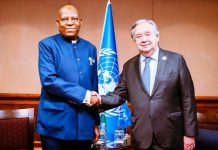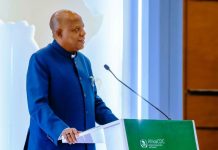Abidjan, Côte d’Ivoire, 14 May 2025—At the 2025 Africa CEO Forum, Olu Verheijen, Special Adviser on Energy to the President of Nigeria, delivered a blunt message to policymakers, investors, and industry leaders across the continent: capital is not African or foreign—it is rational; and Africa must compete for it.
“Let’s be clear: capital has no passport. Sentimental appeals to ‘African capital’ are a distraction,” Verheijen stated. “Capital is opportunistic, not patriotic. It flows where risk-adjusted returns are competitive.”
Multi-billion-dollar deepwater and LNG projects are global capital territory, Verheijen said, and Africa must partner smartly, not from dependency, but from aligned strategic interest.
Citing the fact that Africa attracted $340 billion in upstream capital between 2011 and 2015, a figure expected to drop to less than $130 billion by 2026–2030, she said: “That’s not a funding winter. That’s a structural decimation.”
According to Verheijen, capital is increasingly going to projects with strong economics, low carbon intensity, and predictable governance—the factors attracting billions of dollars in new investment to the Permian Basin, Guyana, and Brazil.
If Africa wants a larger slice of the $500 billion in global upstream spend annually, she argued, it must offer the same clarity and competitiveness.
She noted that Nigeria has been able to prove that this approach works. In under a year, Nigeria unlocked over $8 billion in deepwater and gas Final Investment Decisions (FIDs) through decisive presidential action, focused on improved fiscal terms, streamlined contracting timelines, greater clarity to local content rules, and power sector reforms enabling gas-to-power commercial viability
“We moved from gridlock to greenlight, and investors responded.”
Verheijen urged African investors—DFIs, banks, pension funds, and sovereigns—to be strategic in focus, and to strive to fill the vacuum left by IOCs, not just with funding, but with fit-for-purpose instruments and risk-sharing structures. “Our sweet spot is onshore, shelf, and domestic gas. That’s where African players must dominate, because we understand the terrain, the risk, and the reward.”
She also celebrated the feats of African private sector champions, like Seplat, Oando and Renaissance, who are no longer just “local players.”
Renaissance Africa Energy Consortium’s acquisition of Shell’s onshore JV represents “a symbolic transition from colonial-era concessions to indigenous control.”
Of the new 650,000 barrels per day Dangote Refinery, the largest single-train refinery in the world, she said, “Built by African capital, African hands, and African ambition, this is not just infrastructure, it is proof that African industrial scale is not aspirational. It is operational.”
Seplat’s recent 390 mmcfd gas supply deal with NNPC is “not just output—it’s energy security”, and Nigeria’s attainment of an increase in indigenous equity in gas, from 69 percent to 83 percent, is “not just a statistic but instead a seismic shift in ownership and control of Africa’s energy future.”
But global capital still matters. International Oil Companies, which still account for over 50 percent of production and capital expenditure in sub-Saharan Africa, are now showing signs of an evolving approach.
“They’re no longer chasing barrels. They’re chasing value: low-cost, low-carbon, de-risked assets,” Verheijen said. “Let’s be realistic: Africa cannot negotiate terms on capital that hasn’t yet arrived. Investment must come first; returns and benefits will follow.”
Concluding, she urged: “We must move beyond appeals for support. Africa must become an investment destination by design; anchored in policy clarity, commercial logic, and strategic intent. When we get that right, capital won’t hesitate, it will pursue us. The future will not be given to Africa. It must be built—deliberately, unapologetically, and on our terms.”
Signed
Senan Murray
Team Lead, Communications,
Office of the Special Adviser to the President on Energy
Abuja, Nigeria
14 May 2025






